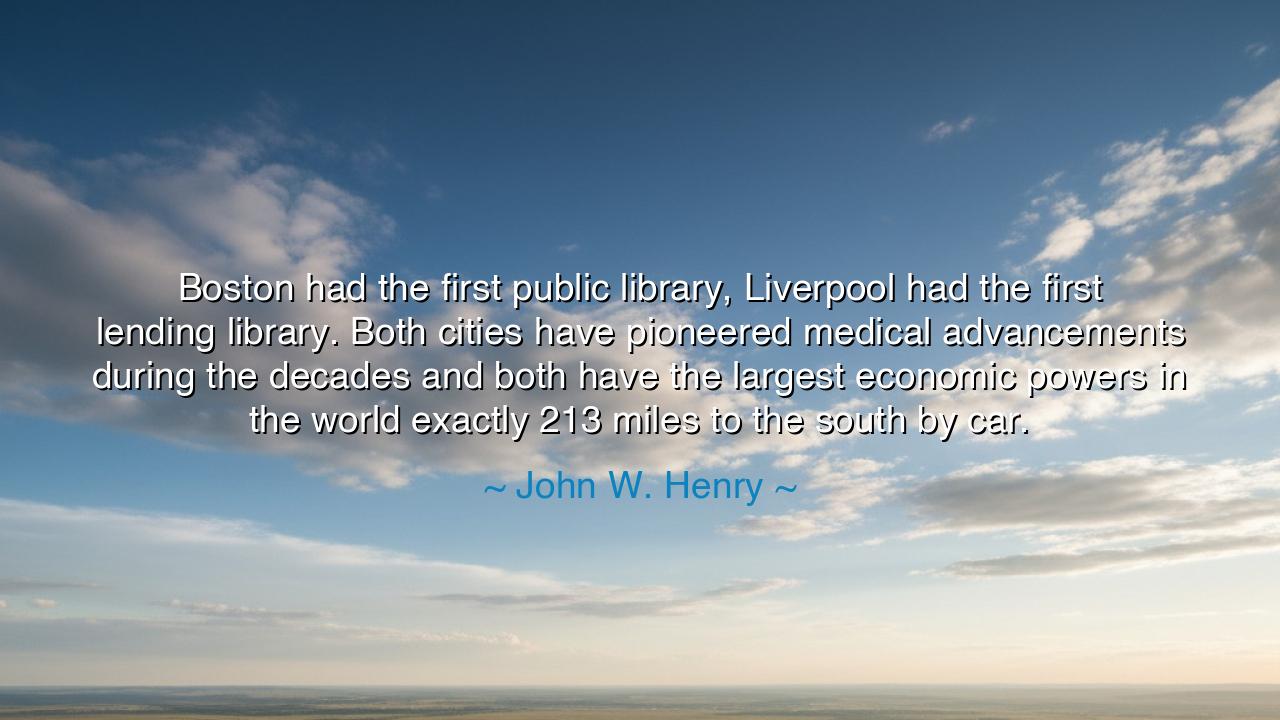
Boston had the first public library, Liverpool had the first
Boston had the first public library, Liverpool had the first lending library. Both cities have pioneered medical advancements during the decades and both have the largest economic powers in the world exactly 213 miles to the south by car.






The words of John W. Henry carry both history and prophecy: “Boston had the first public library, Liverpool had the first lending library. Both cities have pioneered medical advancements during the decades and both have the largest economic powers in the world exactly 213 miles to the south by car.” This utterance, though spoken in the tone of a modern man, resounds like an ancient oracle. It speaks not merely of geography and invention, but of the eternal bond between knowledge, industry, and ambition. These are the lifeblood of civilizations—forces that raise cities from dust and carve empires from the wild.
In the first part, Henry invokes Boston and Liverpool, two cities divided by the vast Atlantic yet united by a shared soul: the hunger for learning. The public library of Boston, founded in 1848, was the first of its kind in America—a temple where the wisdom of ages was opened to all. Liverpool’s lending library, older still, gave to every working man the power to borrow books, to feed the mind freely as one might breathe the air. These were not mere institutions; they were revolutions in human dignity. For when the poor can read, kings tremble, and when knowledge walks among the people, the light of reason burns away the shadows of ignorance.
The second truth Henry speaks is of healing. Both Boston and Liverpool became sanctuaries of medical advancement, where science stretched forth its hand to lift suffering from the earth. From Boston’s hospitals emerged the first public use of anesthesia in 1846—silencing pain itself. In Liverpool, pioneering work in public health transformed how nations battled disease. In both, compassion wore the robe of intellect; progress was not for profit but for the preservation of life. Such acts remind us that knowledge, when guided by mercy, becomes divine.
Yet beneath the poetic symmetry lies a subtle lesson of humility and distance. “Exactly 213 miles to the south by car,” Henry says, marking not just miles of road but the span between labor and power. For south of Boston lies New York, the heart of American commerce, and south of Liverpool, London, the empire’s economic throne. It is as if he whispers: The flame of creativity burns in one city, but the throne of wealth sits in another. Thus has it always been—those who dream and those who rule are rarely the same. Yet they depend on each other, as mind and hand must work in harmony.
Consider the tale of Benjamin Franklin, born a humble printer in Boston, who crossed the ocean to London before returning to kindle the fire of liberty in America. He walked the path of both cities—of Boston’s learning and Liverpool’s industrious heart—and from that fusion of intellect and enterprise arose a new world. Franklin’s life is the living map of Henry’s words: between the scholar’s lamp and the merchant’s coin lies the true art of civilization.
Therefore, my child of tomorrow, hear this wisdom: the measure of a city, or a soul, is not in its towers nor its wealth, but in the libraries it builds, the wounds it heals, and the dreams it dares while others sleep. The road between Boston and New York, between Liverpool and London, is not of asphalt but of ideals—a highway of human striving. To travel it is to journey from knowing to doing, from dreaming to achieving.
Let your life mirror that journey. Build your library—fill your mind with noble thoughts. Tend your hospital—heal what is broken in yourself and others. And then, when the time comes, drive your 213 miles, not to chase wealth, but to make your wisdom serve the world. For those who unite thought with action, learning with labor, become the architects of destiny. And the world, as it has since the days of Boston and Liverpool, shall follow in their path.






AAdministratorAdministrator
Welcome, honored guests. Please leave a comment, we will respond soon